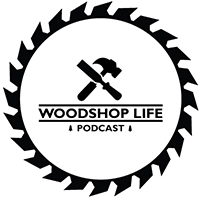Support us on Patreon: https://www.patreon.com/woodshoplife
Guys
1) Hi guys. I have a question for the podcast. I recently made a miter station out of some 3/4 birch plywood. Originally thought I wasn’t going to apply any finish but have decided I would like to mostly for protection of the work surfaces and also for aesthetics. Would it be a bad idea to apply a water based poly to only the visible table top and drawer fronts and skip the inside of the cabinet? On a normal furniture project I know it would be best to finish all surfaces, but wondering if this would be passable for shop furniture. Thanks! John
2) Hi guys, your podcast is brilliant, thank you all.
I am a hobbyist woodworker only, I started after I found out about French cleats when searching shed storage projects. In an earlier podcast Guy talks about the benefits of buying a piece of equipment against fussing about making it when time can be spent better using the tool rather than making it, in my case a crosscut sled which took me a fair bit of time and after finally giving up on the 5 cut method and fixing the fence with a framing square only to find the sled binds so I cut it in half and now have a right and left handed sled, I really would like to buy the Incra mitre gauge and watch many operations where it is used straight on the table saw without a sled, so my question is ‘is a crosscut sled necessary or beneficial “
Thanks for your time -Geoff
Sean’s
1) Hey fellas. I don’t currently have any milling tools. I’ve seen bench top jointers in my research but don’t really hear about or see them in the YouTube or Instagram community. Those are the jointer currently in my budget, am I better off saving up for a big boy jointer or would this get me rolling albeit with smaller projects? Appreciate any and all advice. -Trevor
2) So question for the podcast; what do you think about verical/horizontal lumber storage like this (Shows picture of hotizontal lumber rack with boards laying on their edges/sides instead of laying face down)? I can’t store a lot of lumber vertical as my ceilings aren’t that tall and all my cutoffs are not that long so this was a hybrid solution I thought up but it sounds like a few others have had the same thought. Food for thought?
Huy’s
1) Hello everyone, really enjoy the podcast and learn new things every show! I have a question on how to deal with harmful fumes from finishes, etc. My workshop is in my basement in a completely walled off room from the rest of the basement without any windows….When I have to finish a project I have to move it up into the garage but then I have to deal with dust and other factors that I can’t control since it is a garage. I can control the environment in my shop but being a tad close to the furnace and or other open flame devices…..I really don’t want to blow up the house. I don’t mind drilling through the wall but I really can’t exceed 4″ diameter through the wall to vent to the outside. So do you have any ideas of what kind of fume extraction device exists for this purpose?
Thanks! Kalman
2) Calculating expansion. Is there an actual formula or do I just keep on making an educated guess based on my feelings for what a particular piece of wood might do. A good example to ponder. I recently built a 12 foot tall, solid wood paneled, sliding barn door for a Master Bedroom out of Alder. Each board is 6 inches tall by 30 inches wide and .5 inch thick. The boards are in a dado on both the rail and stile in the door frame. That is 144 inches of horizontal grain that will do what ever it is going to do. How would you calculate or estimate the vertical expansion? – Alex
Links mentioned in the podcast from Huy in regards to calculating wood movement:
